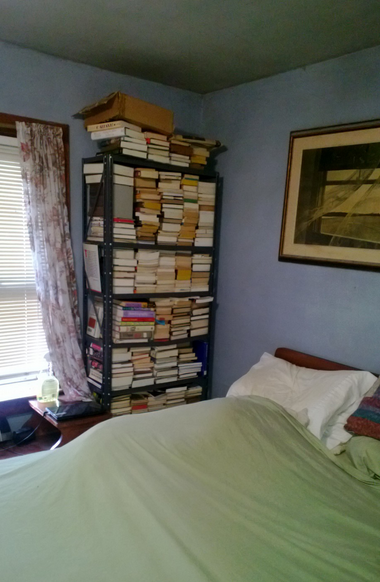In the span of four hours yesterday, my friend Phil and I moved all of the books out of the first floor library to the second floor.
I crammed them into make shift areas.
We also moved all of the bookshelves upstairs as well.
They are standing empty for the most part awaiting final arrangement. Then I will fill them with the books. It is my intention to return my collection to its order of being filed by author.

Although I did make some exceptions to this filing as Phil noted that Gide’s little book on Montaigne was filed under “M.”
Anyhoo, that’s a big chunk of work done. Many thanks to Phil for the help.
My reading continues to converge and overlap over the several books I am reading and my own musing. This morning I was amused to arrive at this paragraph in Van Doren’s History of Knowledge.
“A string quartet… basking musically in the feedback from a live audience, is inspired, in its musical love affair with a thousand strangers, to surpass itself and to take chances. That is impossible in the cold environs of a recording studio, where bits and pieces of a composition may have to be played over and over in a relentless search for perfection by the players. The final product must be perfect, because the medium is unforgiving. But the price of perfection is the loss of the hot, inspired, and courageous greatness of a live performance.’
Van Doren neatly states the view that live music is struggling in contested ways with recorded music. This particular contest is pretty much over since most people in our society connect with music much more through recordings than live performances. It strikes me that it is a false dichotomy. It’s like comparing a physical embrace to a photograph. Different animals. Both can be charming.
Christopher Small is on a clearer track when he tries to understand music as a verb (musicking) which is about relationships and the social arena instead of Platonic shadows on a cave or something more reified. And of course I am beginning to see Glenn Gould as genius of both musicking and recording.
I finished the introduction to McCluhan’s Understanding Media. Here again my reading converges but its not so mysterious since Van Doren mentioned McCluhan and sent me scurrying to my bookshelf (just before packing my books away on shelfs with their spines obscured).

Speaking of McCluhan’s ideas, Van Doren says this: “Data move instantly, reaction follows action without a moment for relaxed consideration, forcing us to depend more on intuition than reasoned thought.”
This put me in mind of Thinking, Fast and Slow by Daniel Kahneman in which he postulates two systems in our minds, system 1 which is the automatic quick comprehensions we make in the moment, system to which is our slower problem solving and reasoning. We spend most of our time in system 1. Van Doren seems to think that our technological environment exacerbates our descent into unreason.
I’m still pondering this.
*****
1. Food Stamp Politics – NYTimes.com
This article recalls that hunger was once a non-partisan concern.
2.Cul-de-Sac Poverty – NYTimes.com
The changing face of poverty: now in the suburbs.
3. Stop the Leaks – NYTimes.com
This is a weird polemic. It doesn’t address the idea that the people seeking the AP phone logs didn’t follow warrant procedure in the law. At least that my understanding.
4. Telling It Like It Is – NYTimes.com
Excellent essay on the relationship of the form a novel takes to its story. Very cool.
5. One School’s Catholic Teaching – NYTimes.com
A woman puts her partner’s name in her mom’s obit. Loses job.
6.Bring Back Ken Starr – NYTimes.com
Careful what you wish for.



